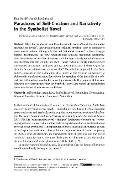Paradoxes of Self-Creation and Narrativity in the Symbolist Novel

Datum vydání
2022Publikováno v
Perspectives on the Self: Reflexivity in the HumanitiesNakladatel / Místo vydání
De Gruyter (Berlin)ISBN / ISSN
ISBN: 978-3-11-069845-9Informace o financování
MSM/EF/EF16_019/0000734
Metadata
Zobrazit celý záznamKolekce
Tato publikace má vydavatelskou verzi s DOI 10.1515/9783110698510-011
Abstrakt
When the Symbolists and Decadents undertook to "break the Naturalist machine for novels", they faced a major technical problem: how to continue to write novels without falling into the old Naturalist recipes? In their struggle against determinism, the new novelists first attacked traditional narrativity, then they deconstructed the characters and the logical background of their stories. Nevertheless, can we still talk about "novel" when a "single man in a tower surrounded by swamps" meditates on his states of mind and the best way to furnish his house, without ever going outside? The solution proposed by the Symbolists consisted in the elaboration of a "novel of the extreme conscience", a philosophic-ontological genre that allows the grasping of the inner life of a subject that self-analyses and builds himself progressively. The purpose of this contribution is to demonstrate that the Symbolist novel has ended up engendering some new forms of modern self-reflection.
Klíčová slova
self-creation, narrativity, Symbolist novel, Naturalism, Determinism, Édouard Dujardin, Remy de Gourmont, André Gide
Trvalý odkaz
https://hdl.handle.net/20.500.14178/1725Licence
Licence pro užití plného textu výsledku: Creative Commons Uveďte původ 4.0 International



